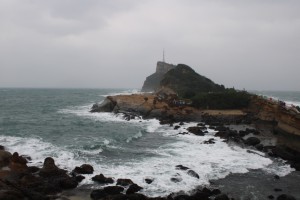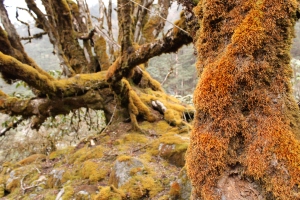Beginning my studies, the first step pleas'd me so much,
The mere fact, consciousness -- these forms -- the power of motion,
The least insect or animal -- the senses -- eyesight -- love;
The first step, I say, aw'd me and pleas'd me so much,
I have hardly gone, and hardly wish'd to go, any further,
But stop and loiter all the time, to sing it in ecstatic songs.
Category Archives: Audio
“Tacit” [Poetry Style #12] by Sikong Tu [w/ Audio]
Without a word,
The gist is grasped.
With no wails or soft sobs,
Sadness spreads heart-to-heart.
There is an enigmatic Prime Mover
With whom each of us either sinks or floats.
Dregs of rustic wine in a fine strainer.
Buds on the cusp of bloom turned back by cold.
Dust motes spreading by Brownian motion.
Sea spume floating and tumbling onto shore.
Shallow, deep, cohering, or scattering.
Of ten thousand, any sample will do.
NOTE: The late Tang Dynasty poet, Sikong Tu (a.k.a. Ssŭ-k‘ung T‘u,) wrote an ars poetica entitled Twenty-Four Styles of Poetry. It presents twenty-four poems that are each in a different tone, reflecting varied concepts from Taoist philosophy and aesthetics. Above is a translation of the twelfth of the twenty-four poems. Translated titles vary: Herbert Giles entitled this one “Conservation,” whereas Tony Barnstone and Chou Ping called it “The Implicit Style.”
“The Sick Rose” by William Blake [w/ Audio]
“Be Not Afeard” [from The Tempest] by William Shakespeare [w/ Audio]
Be not afeard: the isle is full of noises,
Sound and sweet airs, that give delight, and hurt not.
Sometimes a thousand twangling instruments
Will hum about mine ears; and sometimes voices,
That, if I then had wak'd after long sleep,
Will make me sleep again: and then, in dreaming,
The clouds methought would open and show riches
Ready to drop upon me; that, when I wak'd
I cried to dream again.
NOTE: In The Tempest, Act III: Scene 2, Caliban speaks these words to Stephano and Trinculo.
“Renunciant’s Song” by Su Shi [w/ Audio]
The night is clear, even pristine --
A nightscape in silver moonlight.
"Yes, please! Pour me a bowl of wine.
Don't skimp! take it up to the brim."
And why should I chase wealth and fame
When it is sure to end in vain?
Events pass like a horse's sigh,
A spark on stone, or dream travel.
I can put out my ideas,
But who'll accept them as the truth?
Why shouldn't I just live happily
And innocently, like a child?
I could go back to carefree days
When life's trifles weren't torturesome.
Just me, my lute, a pot of wine,
And the stories drawn by the clouds.
NOTES: Song Dynasty Poet, Su Shi, was also known as Su Dongpo. The translated title of this poem also varies. In Deep, Deep the Courtyard, translated by Xu Yuanchong, it is entitled, “Song of Pilgrimage.”
“Mowing” by Robert Frost [w/ Audio]
There was never a sound beside the wood but one,
And that was my long scythe whispering to the ground.
What was it it whispered? I knew not well myself;
Perhaps it was something about the heat of the sun,
Something, perhaps, about the lack of sound --
And that was why it whispered and did not speak.
It was no dream of the gift of idle hours,
Or easy gold at the hand of fay or elf:
Anything more than the truth would have seemed too weak
To the earnest love that laid the swale in rows,
Not without feeble-pointed spikes of flowers
(Pale orchises), and scared a bright green snake.
The fact is the sweetest dream that labor knows.
My long scythe whispered and left the hay to make.
“Natural” [Poetry Style #10] by Sikong Tu [w/ Audio]
Stoop anywhere and pluck it up,
But if you look 'round - it's not there.
Any path may lead you to it.
A stroke of the brush becomes Spring,
And the flowers are in full bloom. --
It's like seeing a new year dawn:
Snatch at it and you won't have it.
Seize it by force and you'll be poorer.
Be like the old mountain hermit --
Like duckweed gathered by stream flow.
Find calm amidst storms of feeling
By knowing Heaven's harmonies.
NOTE: The late Tang Dynasty poet, Sikong Tu (a.k.a. Ssŭ-k‘ung T‘u,) wrote an ars poetica entitled Twenty-Four Styles of Poetry. It presents twenty-four poems that are each in a different tone, reflecting varied concepts from Taoist philosophy and aesthetics. Above is a translation of the tenth of the twenty-four poems.
“Dulce et Decorum Est” by Wilfred Owen [w/ Audio]
Bent double, like old beggars under sacks,
Knock-kneed, coughing like hags, we cursed through sludge,
Till on the haunting flares we turned our backs,
And towards our distant rest began to trudge.
Men marched asleep. Many had lost their boots,
But limped on, blood-shod. All went lame; all blind;
Drunk with fatigue; deaf even to the hoots
Of gas-shells dropping softly behind.
Gas! GAS! Quick, boys! -- An ecstasy of fumbling
Fitting the clumsy helmets just in time,
But someone still was yelling out and stumbling
And flound'ring like a man in fire or lime. --
Dim through the misty panes and thick green light,
As under a green sea, I saw him drowning.
In all my dreams before my helpless sight,
He plunges at me, guttering, choking, drowning.
If in some smothering dreams, you too could pace
Behind the wagon that we flung him in,
And watch the white eyes writhing in his face,
His hanging face, like a devil's sick of sin;
If you could hear, at every jolt, the blood
Come gargling from the froth-corrupted lungs,
Obscene as cancer, bitter as the cud
Of vile, incurable sores on innocent tongues, --
My friend, you would not tell with such high zest
To children ardent for some desperate glory,
The old Lie: Dulce et decorum est
Pro patria mori.
NOTE: Dulce et decorum est pro patria mori is a line written by Horace in Latin that translates to: “It is sweet and fitting to die for one’s country.”
“To One in Paradise” by Edgar Allan Poe [w/ Audio]
Thou wast that all to me, love,
For which my soul did pine --
A green isle in the sea, love,
A fountain and a shrine,
All wreathed with fairy fruits and flowers,
And all the flowers were mine.
Ah, dream to bright to last!
Ah, starry Hope! that didst arise
But to be overcast!
A voice from the Future cries,
"On! on!" -- but o'er the Past
(Dim gulf!) my spirit hovering lies
Mute, motionless, aghast!
For, alas! alas! with me
The light of Life is o'er!
No more -- no more -- no more --
(Such language holds the solemn sea
To the sands upon the shore)
Shall bloom the thunder-blasted tree,
Or the stricken eagle soar!
And all my days are trances,
And all my nightly dreams
Are where thy grey eye glances,
And where thy footstep gleams --
In what ethereal dances,
By what eternal streams.
“Good Things” by Qin Guan [w/ Audio]
Spring rains spur roadside flower growth,
and wildflowers creep to the mountain's base.
Hiking deep up the valley along the stream,
I see and hear hundreds of orioles.
Looking skyward, a cloud becomes a dragon or snake,
But then breaks up, giving way to blue sky.
Lying in the forest under hanging vines,
I can't tell north from south.











